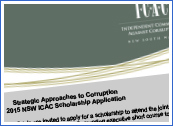
News from the NSW Independent Commission Against Corruption
To sign or not to sign; that is the question

The ubiquitous signature is at the heart of bureaucratic control. Often derided as red tape, signatures formally confirm that a decision has been carried out in accordance with requirements. Additional signatures indicate managers have checked the approvals and the recommendations of those below. Surely then, more signatures means more control, right?
Read more...
My first year as Commissioner

Since my last contribution to Corruption Matters, the work of the Commission has come under increasing scrutiny from public commentators, public officials and the courts. Much of the debate generated by the Commission’s proposed investigations over the last 12 months has centred upon the scope of the Commission’s jurisdiction.
Read more...
Governance and the lucrative extractive industries

Economist Daniel Kaufmann believes natural resource governance is the greatest developmental challenge of the next decade. As president of the Natural Resource Governance Institute, he leads an organisation that aims to ensure that people – ultimately – are the greatest beneficiaries of their country’s own oil, gas and mineral resources. In November this year, US-based Dr Kaufmann will speak at the biennial Australian Public Sector Anti-Corruption Conference in Brisbane.
Read more...
Sponsorship under the procurement safety net

The motivation for private sector sponsorship of government activities is rarely an altruistic or charitable one. After all, paying tax is enough for most – why would you be willing to give more? In most cases, it is reasonable to assume that the sponsor is looking for some commercial advantage. But there are genuine opportunities for government that need not be passed up.
Read more...
Corruption in the classroom: tough lessons to learn

In April, the ICAC released its findings on a research paper into corruption risks associated with international students at universities in NSW. The underlying message of the report is clear: it is unsurprising that problems are emerging but there are no simple solutions.
Read more...
Applications now invited for ICAC scholarships

Senior state and local government executives and managers in NSW are invited to apply for one of 10 scholarships to attend the short course “Strategic responses to corruption”. Tracy Burgess, a director at NSW Trustee & Guardian (NSWTG), was a scholarship recipient in 2014 and shares her experience as a course participant.
Read more...
In charge of complaints? Read on!
Last year, the NSW Ombudsman commenced a project to develop a complaints framework and policy in line with key changes to a national standard. Deputy Ombudsman Chris Wheeler explains that the aim of these guidelines is to help you become compliant with the revisions.
Read more...
In other news

One of the goals of the ICAC is to educate public sector agencies, public officials and members of the public about corruption and how to report it. Training workshops, rural outreach visits and other engagements are undertaken by ICAC staff throughout the year to achieve this goal.
Read more...
